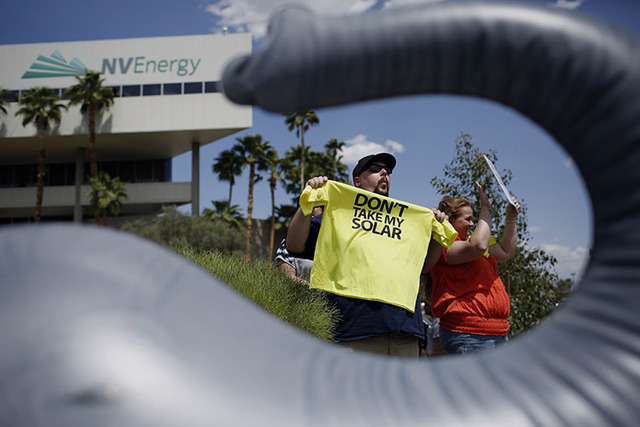Campaign for energy deregulation picking up steam in Nevada

Discussion is picking up on the Energy Choice Initiative, with more people taking public positions on the ballot measure that aims to deregulate electrical service in Nevada. Here are things to know about Question 3:
HOW DOES IT WORK?
If the measure passes the statewide ballot in November and again in 2018, it will enshrine in the Nevada Constitution the right for customers to choose their energy provider and to produce their own power to sell to others. It directs the Nevada Legislature to pass laws authorizing an open, competitive electricity market by mid-2023.
A “yes” vote supports changing the constitution; a “no” vote keeps it the same.
Nevadans for Affordable, Clean Energy Choices, the PAC backing the measure, announced last week that it’s assembling a team of experts to research how 14 other states have transitioned to open energy markets. Deregulation can take many forms and has had mixed results in the states where it was implemented. Experts say the devil is in the details as Nevada designs its plan.
WHERE ARE WE NOW?
Nevada laws allow investor-owned utility companies, such as NV Energy, to be monopolies in their service territories. The governor-appointed members of the Nevada Public Utilities Commission act as a substitute for the competitive forces of the market, approving or rejecting rate changes so companies can make a reasonable profit but aren’t gouging customers.
The regulated monopoly model has emerged over the past century as the state sought to make it worth companies’ while to bring expensive electrical infrastructure to Nevada, but critics say it restricts them from using companies that might provide power from 100 percent renewable sources.
In recent years, several major Nevada companies have tried to leave NV Energy’s network to make or find their own power, including Wynn Resorts, MGM Resorts and Las Vegas Sands.
The Public Utilities Commission has allowed some companies to leave the grid but is charging them exit fees, saying the broader customer base could be left holding the bill for infrastructure that’s still being paid off.
WHAT ARE THE PROS?
Ballot measure proponents don’t like Nevada provisions guaranteeing electric companies make a profit, and say it’s a problem that rates are approved by a government commission instead of being determined by competitive market pressure.
“Many people believe that competition in the electricity market drives prices down and provides more resource options for residents and businesses,” proponents said in their official argument published by the Nevada Secretary of State. They point to a 2013 analysis that cited Nevada’s average industrial electricity rates as second-highest in the region behind California’s, and said that could make it difficult for Nevada to attract businesses such as energy-intensive data storage centers.
More flexibility among electricity providers could also be attractive to environmentally conscious companies.
“Many businesses, including those who would relocate here and create new jobs, want more renewable energy,” proponents wrote.
WHAT ARE THE CONS?
Opponents of deregulation say there’s no evidence that the process lowers energy prices or spurs renewable energy development, and say government regulation has helped keep Nevada electricity prices steady.
Nevadans pay an average of 44 percent less for electricity than California, which has deregulated its markets, and 20 percent less than the U.S. as a whole, according to May 2016 data from the federal Energy Information Administration.
“Nevada’s energy is too important of a public resource to permit the unpredictable and uncontrollable cost increases that this market deregulation initiative would threaten,” attorney Bradley Schrager wrote in an argument against the ballot measure.
Opponents argue t
That NV Energy is already transitioning toward renewable energy, ranking 7th in the country for the most solar power added last year.
WHO IS BEHIND IT?
The PAC behind the measure is drawing most of its money from the Las Vegas Sands casino company and a small amount from MGM Resorts International, according to the most recent campaign finance disclosure documents filed in June.
Electric carmaker Tesla and data storage company Switch have publicly supported the measure, saying it fits in line with their company values and would create opportunities in renewable energy. Democratic Sen. Harry Reid is in favor.
The AFL-CIO union said they will actively campaign against the measure, telling the Las Vegas Sun that they represent 200,000 people whose bills could go up if it prevails.
MOVING FORWARD
NV Energy is neutral on the measure, which is broad and gives the Legislature significant power to determine particulars. But the company issued a series of eight guidelines last month that it hopes will shape the details of deregulation policy if the measure passes.
The company wants to ensure that investments it’s already made under the current regulatory system pay off going forward. They also want any restructure to protect existing jobs and require all companies in the market to abide by the same standards.
Those include meeting benchmarks for renewable energy production, sticking to a consumer complaint resolution process and complying with consumer protection standards.
The Review-Journal is owned by the family of Sheldon Adelson, chairman and CEO of Las Vegas Sands Corp.